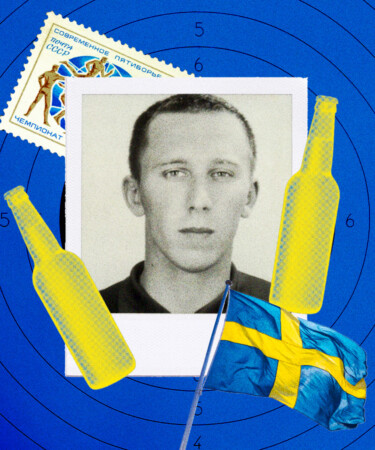Athletes turning to drugs to up their game or calm their nerves is nothing new — and neither is them getting caught. The sports world has seen cyclist Lance Armstrong stripped of seven Tour de France titles, baseball star Alex Rodriguez suspended for 162 games, and an entire nation banned from the 2014 Sochi Olympics due to state-sponsored doping. But juicing at the Olympic Games hasn’t always been illegal, and one substance that eventually knocked one competitor off the podium could be sitting in your fridge right now.
Before 1968, the International Olympic Committee (IOC) had no guidelines regarding prohibited substances, and many athletes took advantage. The abuse of amphetamines (usually speed) was relatively common, and some coaches even encouraged marathon runners to drink rat poison-and-Champagne cocktails for an energy boost during races. But following a large-scale anti-doping movement in the 1960s, which was furthered by a competitor passing out drunk at the 1965 Pentathlon World Championship, the IOC took action.
At the 1968 Mexico City Games, the IOC introduced a list of banned substances that each Olympian would be tested for following their events. In addition to stimulants, narcotics, and anabolic steroids, alcohol also made the list, and offending athletes would fail their test if they had a blood alcohol content (BAC) of 0.04 or higher. Still, this prohibition didn’t stop one Swedish pentathlete from imbibing shortly before he was set to compete.
On the third day of the pentathlon — a competition including equestrian slow jumping, fencing, pistol shooting, swimming, and running that once spanned five days — Hans-Gunnar Liljenwall was in good standing. He had put forth solid performances in the equestrian and fencing rounds on days one and two, but by day three’s pistol shooting contest, the athlete’s nerves had caught up to him. To calm his mind, Liljenwall drank two beers just before he was set to shoot — and he shot well, pushing the Swedish men’s team closer to a podium position so long as they kept up in swimming and cross-country. Then came the drug test.
As drug test results took a few days to complete back then, Liljenwall and the rest of his team finished the competition and earned a bronze medal for their performance. However, after the medal ceremony, the team was informed that Liljenwall failed his drug test, with his BAC exceeding the 0.04 limit. The entire Swedish team was disqualified and stripped of their third-place win.
Liljenwall, with just two beers in his system, thus became the first and only Olympian to be disqualified and banned for drug use. (The pentathlete gave things another try at the 1972 Munich Games, though he only placed 25th individually and 8th with his team.)
While the IOC eventually did away with its alcohol testing in 2018, several countries still forbid their athletes from imbibing — and for good reason. After all, it’s probably not the best idea to down a few beers before picking up a gun.
*Image retrieved from Augustas Cetkauskas via stock.adobe.com
